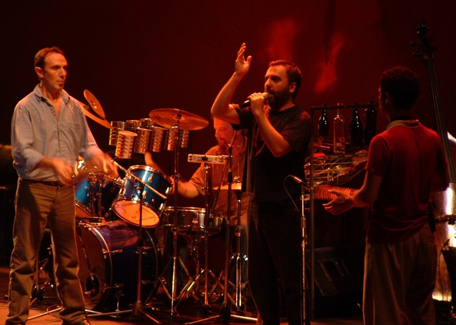DIRECTOR
> THEATRE | MUSICAL THEATRE | OPERA | SPECIAL PROJECTS
de protesta
(2004)
de protesta
A musical evening by Alejandro Tantanian
de lágrimas was the first of a series of three shows that, under the axis of a topic, outlines a journey for time through the music.
de protesta is the second show of this triptych.
Watering in the repertoire that goes from the Russian Revolution to our days, de protesta will attempt a journey for times and diverse geographies to show how humankind found a way of expression and resistance in the lyrics and the music.
How to sing “protest songs” in these times where the disappearance of the public sphere seems to be one of the most salient characteristics? Perhaps we can find the answer traveling that divides the public and the private space. Then, de protesta will not “gather” only songs of social protest or barricade, there will be also the space for those songs of “private protest”: the individual's private complaint in front of the pain of an abandonment or the incomprehension of a certain situation. It will be, then, the journey of that limit, the “go and return” on those two fields what will give to the “protest” its space of representation.
We will not provoke a nostalgic look on what the last decades made to history and to us. Not at all. It is not a show for nostalgic people, a show to remember with imprecise happiness those times where the big stories still represented us.
We will try to put in perspective those sounds on the cracked present time, we will try to say those same words in a context that can uncenter them. And neither we are in front of an intent of parody of those speeches, parodies taken ahead without pause in the scenarios of the city of Buenos Aires during the decade of the '90, times where the politics had been taken to the margins.
Alejandro Tantanian
Repertoire
La internacional (Eugène Pottier - Pierre Degeyter)
Diamantes en almíbar (Jorge de la Vega)
Mala (Liliana Felipe)
Orge me dijo (Bertolt Brecht)
Hijo de (Jacques Brel)
En este campo (Miguel Hernández – Marcelo Moguilevsky)
Las trincheras (Kurt Tucholsky – Hans Eisler)
Balada de la prostituta para judíos María Sanders (Bertolt Brecht - Hans Eisler)
Die Ballade von Wasserrad (Bertolt Brecht - Hans Eisler)
Flor arrancada (Anonymous)
Canto de las pobladas de Khor (Anonymous)
Soy un autor dramático (Bertolt Brecht)
El gallo rojo (Song of the spanish Civil War)
El frente de los trabajadores (Bertolt Brecht - Hans Eisler)
Remanso (Federico García Lorca – Daniel Viglietti)
Barro tal vez (Luis Alberto Spinetta)
Canción de la Cantata Santa María de Iquique (Luis Advis)
Placeres (Bertolt Brecht)
¿Qué recibió la mujer del soldado? (Bertolt Brecht - Kurt Weill)
Libérate (Raga – Huertas)
La gota de agua (Chico Buarque)
Ojalá (Silvio Rodríguez)
Mi libertad (Georges Moustaki)
-
de protesta
-
with
Alejandro Tantanian (voice) -
Músicos
Marcelo Katz (piano y accordion)
Diego Wainer (contrabass y guitar)
Iván Barenboim (winds)
Miguel Rausch (percussion) -
and
Diego Brizuela
Noelia Leonzio
Fernanda Pagadizábal
Nahuel Pérez Biscayart
Griselda Siciliani
Javier Van De Couter -
Direction assistant
Ana Belén Saint Jean -
Production assistant
Martín Grosman -
Choreography
Carlos Casella -
Lights
Jorge Pastorino -
Set and costumes
Oria Puppo -
Musical arrangements
Marcelo Katz
Marcelo Moguilevsky
Miguel Rausch -
Idea and dramaturgy
Alejandro Tantanian -
Musical direction
Marcelo Moguilevsky -
Direction
Alejandro Maci
Alejandro Tantanian -
Running time: 100 minutes
-
Premiere: January 2004, Sala Casacuberta, Teatro San Martín, Complejo Teatral de la Ciudad de Buenos Aires (CTBA), Argentina
-
